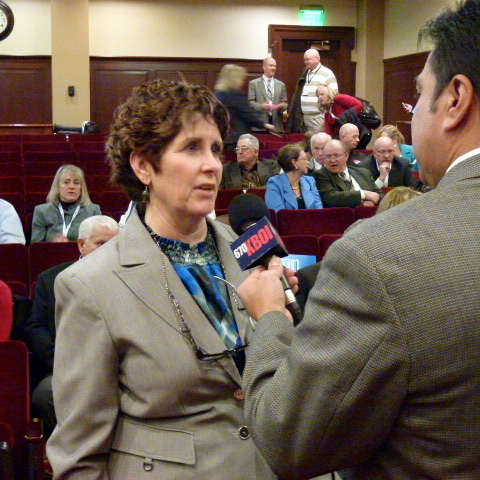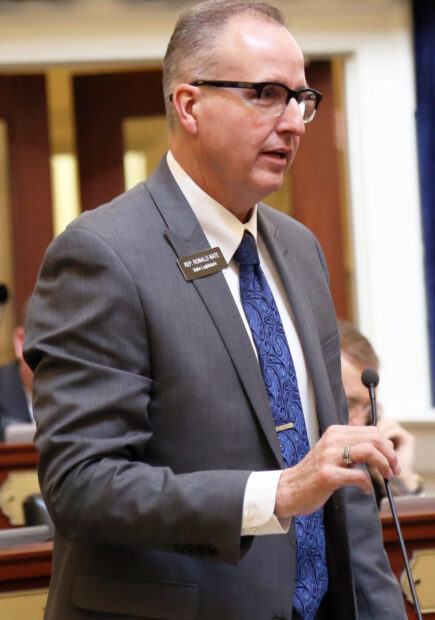The leaders of one of Idaho’s major education groups are taking a stand on school funding priorities — they won’t support new education funding initiatives until their main priorities are met.
This month the Idaho School Boards Association’s executive board adopted a policy calling for state lawmakers to fully fund teacher pay increases under the career ladder salary law and to bring districts’ operational funding pools up to 2017 levels, with inflation factored in.

Until that occurs, the ISBA is pledging not to support any new education initiatives that would receive funding as K-12 budget line items.
ISBA Executive Director Karen Echeverria said the group’s board adopted the policy after discussing budgetary needs and looking at the school funding picture in terms of pieces of a pie.
“Each time a new initiative or new line item comes along, that still means a slice is taken out of the pie so there will be less (money) in operations funding,” Echeverria said.
Adhering to the new financial philosophy means the ISBA’s executive board is opposing a number of education proposals drafted by Idaho school boards. That includes taking a formal “do not pass” position on one of Superintendent of Public Instruction Sherri Ybarra’s signature legislative priorities — establishing a new rural schools education center.
Buhl’s school board has also backed the rural schools center.
Ybarra called for the rural schools center during the 2016 legislative, but the proposal failed when the Legislature adjourned for the year without approving it or providing funding.
Ybarra is again going to make the case for a rural schools center in 2017. Her proposed 2017-18 budget calls for $300,000 in new spending to establish the center.
During the 2016 legislative session, lawmakers returned operations funding to levels reached in 2009. The 2009 budget was the high-water mark before a series of budget freezes and cuts were implemented in response to the Great Recession.
The Idaho Education Association has also called for increasing operations funding to 2017 levels with inflation factored in, but neither education group has been able to calculate the dollar amount they are asking lawmakers to hit.
“We’re not back there yet,” IEA president Penni Cyr said. “We still struggle with discretionary funding.”
“Obviously it’s not going to happen in a year or two,” Echeverria said.
Members of the ISBA will meet in November to consider a slate of resolutions and policy positions ahead of the 2017 legislative session. So far, there are 12 resolutions to consider, and they touch on a number of hot topics that have come before the Legislature.

The Boise school board has passed a resolution opposing amending a section of the Idaho Constitution known as the Blaine Amendment. Boise trustees said the state constitution, as written, “ensures the separation of church and state in Idaho by prohibiting the flow of public money to private or religious institutions for education.”
During the most recent legislative session, Rep. Ron Nate, R-Rexburg, proposed amending the Blaine Amendment, arguing some students’ abilities to use state scholarships at church schools such as Brigham Young University-Idaho — where Nate is employed — could be in jeopardy. Nate’s effort failed, and opponents argued that amending the state constitution in such a way would clear the way for a system of school vouchers in Idaho.
During its November meeting, the ISBA will also consider resolutions calling to lower the two-thirds supermajority requirement to pass school facilities bonds and another proposal to lower the threshold for a school board to enter a closed-door executive session. Current law requires a two-thirds vote of the governing body to enter into executive session, but the St. Maries school board proposes dropping that requirement to a simple majority.
“Many school districts in Idaho may have a quorum present, however, cannot enter into executive session because of the lack of a two-thirds vote of the governing body to do so,” according to the resolution St. Maries trustees approved.
The complete list of ISBA resolutions up for consideration in November is available online.
If ISBA members pass a resolution at November’s meeting in spite of a “do not pass”— such as Ybarra’s rural schools center — IBSA lobbyists would honor their members’ vote and advocate for the resolution’s passage during the legislative session, Echeverria said.
